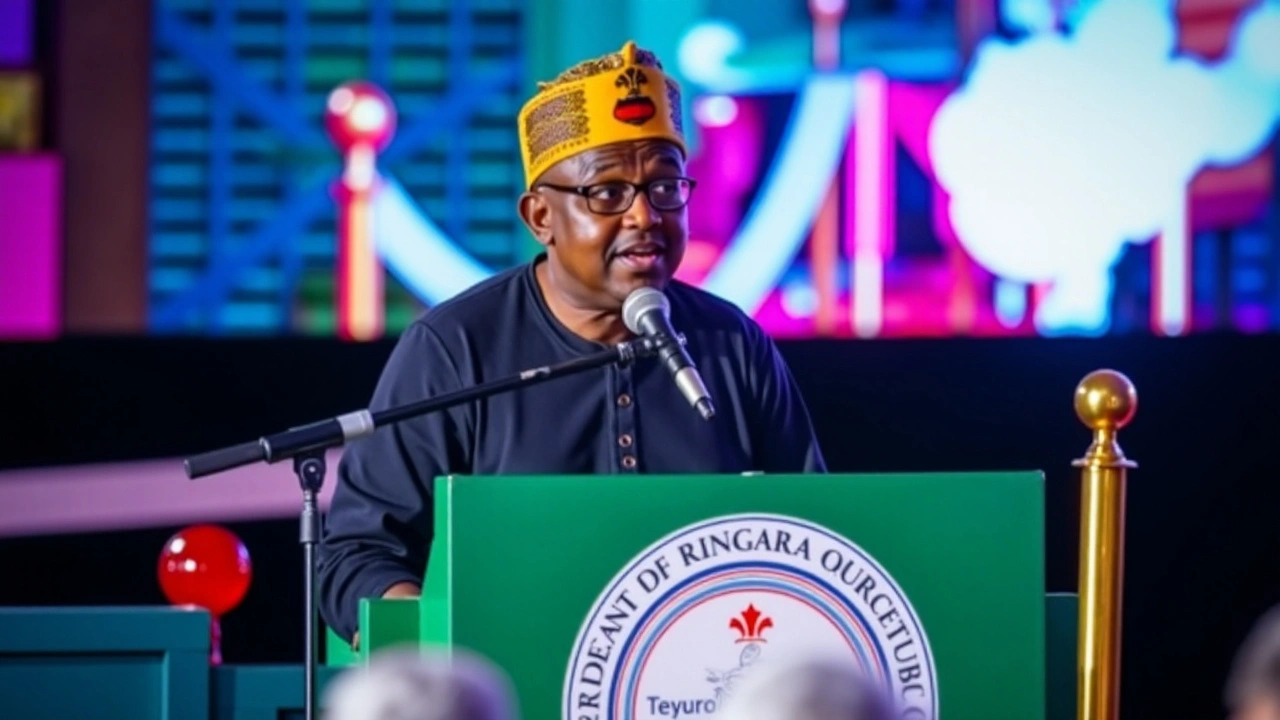3MTT Programme: Transforming Nigeria's Job Market
The Presidency has unveiled a groundbreaking initiative, the 3MTT (Three Million Tech Talents) programme, which is set to radically transform the job market in Nigeria. This ambitious program aims to create three million jobs for youths by 2025. The initiative is part of President Tinubu’s pledge to generate two million digital jobs within the same timeframe, showcasing a strong commitment to youth empowerment and technological advancement.
Building a Digital Workforce: Training and Opportunities
The 3MTT programme is designed to offer extensive training and employment opportunities in the rapidly evolving tech sector. Areas of focus include pivotal fields such as software development, data analytics, and cybersecurity. These sectors are not only fundamental to the digital economy but also represent some of the fastest-growing job markets globally. By equipping young Nigerians with these critical skills, the programme aims to bridge the existing skills gap and prepare a future-ready workforce.
Addressing Youth Unemployment
One of Nigeria's most pressing challenges is youth unemployment. With a significant proportion of the population being under 30, providing viable employment opportunities for this demographic is crucial. The 3MTT programme is strategically aimed at addressing this issue head-on. By focusing on the tech industry, the initiative seeks to leverage one of the most dynamic and resilient sectors of the economy to catalyze job creation.
Strategic Partnerships and Stakeholders
To ensure the successful implementation of the 3MTT programme, the Presidency is collaborating with several key stakeholders. These include major tech companies, educational institutions, and government agencies, all of whom play a critical role in the ecosystem. These partnerships are expected to provide the necessary resources, expertise, and infrastructure to support the training and employment of three million young people. This collaborative approach is essential for the programme's success, fostering an environment where public and private sectors work together towards a common goal.
Economic Growth through Technological Advancement
The 3MTT programme is part of a broader strategy to harness technology for economic growth. By investing in the tech sector, the government hopes to drive innovation, enhance productivity, and position Nigeria as a leader in the digital economy. This, in turn, is expected to attract further investment, create additional job opportunities, and stimulate economic activity. The initiative underscores the critical role that technology plays in modern economies and highlights the importance of developing a skilled workforce to sustain economic progress.
Impact on the Job Market
The anticipated impact of the 3MTT programme on the job market cannot be overstated. With three million new tech jobs, the programme is set to significantly reduce unemployment rates among young people, offering them not just jobs, but meaningful careers with the potential for growth and development. It provides a pathway for youths to enter and thrive in the tech industry, which is characterized by high demand, competitive salaries, and opportunities for continuous learning and progression.
The Role of Education
Educational institutions are expected to play a pivotal role in the 3MTT programme. By aligning curriculum with industry needs, these institutions can ensure that graduates possess the skills required by employers. Moreover, partnerships between tech companies and universities can facilitate internships, apprenticeships, and hands-on training opportunities. This integrated approach ensures that the training provided is relevant and up-to-date with current industry standards.
Conclusion: A Promising Future for Nigeria’s Youth
The 3MTT (Three Million Tech Talents) programme represents a significant step towards addressing youth unemployment and harnessing the potential of the tech sector to drive economic growth. With the support of key stakeholders, the initiative is poised to create meaningful and sustainable job opportunities for the nation's youth. As the programme unfolds, it holds promise not only for individual career development but also for the broader economic transformation of Nigeria.






Lois Parker
August 13, 2024 AT 17:30Life feels like a river that sometimes runs dry, and this new tech programme is a hopeful rain. It could give young people a chance to learn, but we’ll see if the promises hold.
Lerato Mamaila
August 14, 2024 AT 15:43Absolutely, the initiative mirrors the spirit of many African innovations; it’s a step toward bridging gaps, and it celebrates our shared cultural drive for progress.
Dennis Lohmann
August 15, 2024 AT 13:56Hey everyone, happy to see this focus on tech skills! If you need pointers on where to start learning Python or data analysis, just let me know 😊.
Jensen Santillan
August 16, 2024 AT 12:10One must question whether such top‑down schemes truly address the structural deficiencies of the Nigerian tech ecosystem. While the rhetoric exudes optimism, the execution consistently falters under bureaucratic inertia, leading to a dissonance between policy and praxis. Moreover, the selection criteria remain opaque, fostering elitism under the guise of inclusivity. The metrics touted-three million jobs-ignore the nuanced realities of labor market absorption rates, which are notoriously volatile. Consequently, the programme risks becoming a performative showcase rather than a substantive catalyst for economic transformation.
Mike Laidman
August 17, 2024 AT 10:23The plan sounds grand but lacks concrete steps and measurable milestones
J T
August 18, 2024 AT 08:36Honestly it’s just hype and empty promises 😒
A Lina
August 19, 2024 AT 06:50From a strategic HR perspective, the talent pipeline proposed by the 3MTT initiative must align with competency frameworks and skill‑matrix assessments to mitigate competency gaps and ensure scalability across digital domains.
Virginia Balseiro
August 20, 2024 AT 05:03Whoa! This is exactly the kind of electrifying momentum we need-imagine thousands of bright minds igniting the future of tech in Nigeria! 🌟
Jared Mulconry
August 21, 2024 AT 03:16I think it’s important we keep a balanced view, acknowledging both the potential benefits and the challenges without inflaming the debate.
Brandon Rosso
August 22, 2024 AT 01:30Indeed, fostering collaboration between government, academia, and industry can create a synergistic environment where opportunities flourish, and we remain hopeful for measurable progress.
Tracee Dunblazier
August 22, 2024 AT 23:43While the enthusiasm is commendable, the underlying framework appears somewhat vague, and I’d recommend a more rigorous roadmap.
Edward Garza
August 23, 2024 AT 21:56I concur with the need for rigor; otherwise, the initiative may simply add another layer of bureaucratic noise.
Allen Rodi
August 24, 2024 AT 20:10For anyone interested, there are already a handful of bootcamps offering free courses in cybersecurity and data analytics-definitely worth checking out.
Jody Webster
August 25, 2024 AT 18:23But…doesn't this just create a false sense of security?!; after all, jobs aren't magically generated; they require real infrastructure!!!
Steve Goodger
August 26, 2024 AT 16:36Having spent over a decade mentoring young professionals across various African tech hubs, I can attest that capacity‑building initiatives yield the most sustainable impact when they embed continuous learning pathways rather than one‑off training bursts. First, the curriculum must be co‑created with industry leaders to reflect real‑world demands, ensuring graduates possess both hard and soft skills. Second, mentorship programs that pair novices with seasoned practitioners foster knowledge transfer and professional networking. Third, access to affordable hardware and reliable internet is non‑negotiable; without these, even the best curriculum falters. Fourth, local universities should integrate modular courses that allow students to specialize without sacrificing breadth. Fifth, government incentives need to target startups that commit to hiring program alumni, creating a feedback loop of employment. Sixth, robust assessment mechanisms must be instituted to track skill acquisition and job placement outcomes over time. Seventh, partnerships with multinational firms can open apprenticeship pipelines that expose youths to global best practices. Eighth, fostering an ecosystem of tech meetups and hackathons encourages innovation and community building. Ninth, financial literacy workshops empower graduates to manage earnings and consider entrepreneurial ventures. Tenth, alumni networks should be nurtured as they become ambassadors for the program, attracting further investment. Eleventh, continuous curriculum updates are essential as technology evolves at a breakneck pace. Twelfth, gender‑inclusive policies must be embedded to ensure equitable access for all. Thirteenth, transparent reporting builds public trust and aids in iterative improvement. Fourteenth, aligning the initiative with national digital transformation strategies amplifies its relevance. Fifteenth, leveraging data analytics to monitor labor market trends can inform future training priorities. Ultimately, when these elements harmonize, the promise of three million tech jobs becomes not just a headline, but a tangible reality for Nigeria’s youth.